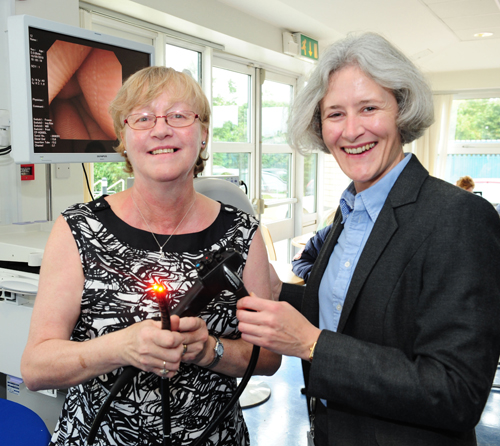Tallaght Hospital launches two year results of Colorectal Cancer Screening Programme
Posted on: 14 September 2010
The Adelaide and Meath Hospital, Dublin Incorporating the National Children’s Hospital (AMNCH) and Trinity College Dublin (TCD) Colorectal Cancer Screening Programme launched the results of the first two years of the bowel screening programme today (14th September). The results show the programme to be highly successful. The results highlight that 137 people tested positive for advanced neoplasia or cancer in the Tallaght area alone. AMNCH is the 1st hospital in the country to offer a screening programme. The research offers a unique opportunity to assess, adjust and enhance proposed pathways, prior to the roll-out of a national programme.
Speaking at the launch of the annual report, Professor Colm O’Morain, Consultant Gastroenterologist at AMNCH and Dean of Health Sciences at Trinity College Dublin explained: “The expertise gained from this programme will be particularly crucial in the commencement of future countrywide colorectal screenings. It is estimated that practically all colorectal cancer can be prevented or cured if early stage cancers are detected and removed. In a two year period in the Tallaght area alone, we detected 137 cancers or early stage cancers (neoplasia). The study also demonstrates the substantial impact on pathology and radiology services as a necessary consequence of the introduction of a nationwide screening programme.”

Patient Marie Barnes with Dr Deirdre McNamara, Senior Lecturer in Clinical Medicine/Consultant Gastroenterologist, TCD/ Tallaght Hospital.
Since the screening programme began in 2008, 10,000 men and women, between the age of age of 50 and 74, have been offered free bowel screening. Of the 10,000 offered screening, 5,063 accepted. This is a participation rate of 51% and of these 10% tested positive for blood, higher than the 6% rate that was expected. Cancer was detected in 38 tests and advanced neoplasia (early stage cancer) in a further 99.
Test kits were sent to people’s homes and they decided whether or not to participate. Patients were able to do the test privately and then returned it to AMNCH where it was analysed. The test detects tiny amounts of blood, often released from bowel cancers or polyps into the bowel motion (faeces). To increase the chances of detecting tiny amounts of blood in the bowel motion, participants were asked to provide samples from two separate bowel motions.
Once a patient tested positive for blood they went on to have a colonoscopy in one of AMNCH’s weekend colonoscopy lists. These weekend lists were set up to meet the increased demand in capacity in which over 419 screening colonoscopies were performed. The overall uptake of colonoscopies for the programme was 87%, and this is in line with the new NHS Bowel Cancer Screening Programme.
Mrs Marie Barnes, who was a participant in the programme, spoke about her experience of the programme: “I had no signs or symptoms, nothing. I was the perfect candidate for cancer without even knowing it. I thought I had the perfect bowel. If it wasn’t for the Bowel Screening Programme, I would have never known. I owe my life to them”.
The AMNCH-TCD Colorectal Cancer Screening Programme has demonstrated the importance of formal approaches in developing and implementing cancer screening programmes. The expertise gained from this programme will be particularly crucial in the commencement of future country-wide colorectal screening programme.
Early detection is vital in the fight against bowel cancer. Survival rates are low for cancer at any stage; however, this programme has proved that screening and early detection can save lives.
Trinity in the News:
- Irish Times, Health Supplement
- Irish Times
- Morning Ireland
- RTÉ News
